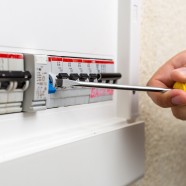
The electrical panel in your home or business is where the electricity to the building is controlled. Different panels are able to handle different amounts of electricity flowing through them, and older panels traditionally are rated for far less power than newer models. This type of electrical upgrade cost depends on a number of factors, from local labor costs to the state of your building’s wiring system. Compare the cost vs. the benefits to decide if an electrical upgrade is right for you.
Reasons to Upgrade
An electrical upgrade can be an absolute necessity, or it can be a job you’re investing in because you think you’ll need it in the future. From most crucial to the least in terms of upgrades:
- Electrical danger: If your residential wiring is outdated and you’re seeing sparks and smoke from outlets, your panel may not be up to the task you’re assigning it. Older wiring and overused power systems can be an intense fire hazard. Get this changed as soon as possible.
- Quality of life: As your family or business grows, you’ll want more appliances and devices to make your life comfortable. Increase power usage means you’ll need to upgrade your panel in order to handle the increased load. If you’ve gotten to the point where you use multiple extension cords, it’s time for an upgrade
- Property values: If you’re thinking of selling or are simply getting a building into shape for any future sales, electrical renovations can increase the value of your home or business. Older panels may say “old wiring” to a buyer, making him more reluctant to bid. Updated panels, on the other hand, imply that you’re on top of small details that become important later.
Labor Costs
The largest part of your electrical upgrade cost will be the labor involved. The average electrical panel is going to take 8 to 10 hours to replace, and that’s if there’s no underlying issues that have to be dealt with. In 2015, electrical costs for jobs of this nature cost around $50 to$80 an hour, so budget a minimum of $800 for the labor on a basic job. If your property is older or you’ve changed the use in the building, the work and costs can be significantly higher.
Materials Costs
Most new electrical panels will cost $500 or less for a basic model. The electric company may have to run new wiring, which will cost extra, plus you’ll need to pay for small items such as fasteners. This little additions can add around $100 to your bill.
Extra Costs
Once an electrician starts looking into your electrical system, he may find an entire list of additional items that need upgrading. It’s less likely to happen with a relatively new system, but if you’re going through electrical renovations on a historic house, the wiring in the entire building may well need replacing. Your contractor will explain the options and reasons behind each needed replacement. It’s important to get all the work done at the same time to reduce risk of electrical fires and to create a cohesive system throughout the building.
In addition, you’ll need to pay for any required permits your community requires for doing electrical renovations on local buildings. Your contractor can advise you about which permits are needed, and he can arrange them with the local government.
Hidden Advantages
While the costs connected with upgrading an electrical panel may seem significant, the job can be an advantage if you’re planning on more interior renovations. When walls are already torn apart to get to interior wiring, it’s much less expensive for contractors to come in and redo the interior of your home or office. By combining a renovation with an electrical upgrade, you can save money on both jobs at the same time.

Recent Comments